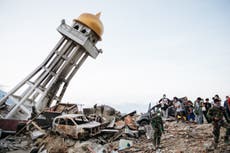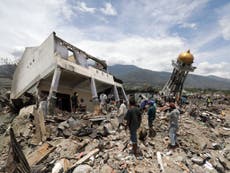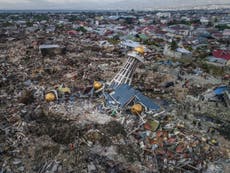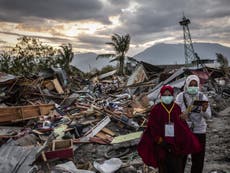The most heartbreaking thing about the Indonesian earthquake is the emotional trauma that it’s left behind
Natural disasters and conflicts can rob the most vulnerable people in society of a livelihood and a support system. But the ensuing emotional damage can last for a lifetime

One month ago, a nightmare arrived in Indonesia. An earthquake hit, and was so strong that the earth turned to liquid, and a tsunami struck the heart of a major city.
I’ve just returned from one of the worst affected areas, Palu. I’ve been working in humanitarian crisis for several years, but I found the things I saw there almost unbelievable. People here, particularly women and children, badly need our help.
More than 60,000 houses have been destroyed; thousands of people are left homeless. The government and charities here are still assessing the full scale of the damage, but it spans from houses that have been partially damaged to others that have been completely swallowed up by the ground. I saw this myself, and it‘s hard to comprehend. I’ve even been told that, in some places, two or three houses were sucked under, one house after another, as if stacked on top of each other like blocks. No trace of them left behind.
The local response has been incredible. Community organisations, local government teams, business people and neighbours immediately scrambled to provide materials to make small camps, shelters and safe spaces for children. Local woman Lian, for example, has set up a food kitchen where she is producing nearly 5000 meals a day for people living in camps.
One of the most humbling things about being here, as a man, has been witnessing first hand how vital women are to rebuilding a community. I know from experience as an aid worker that, when local women lead the response to a disaster, it can make a huge difference in the long term. Women like Lian, or like my colleague Francisca “Iko” Fitri, who heads ActionAid in Indonesia, are often the first responders to a crisis like this, and they bring knowledge and skills that make the relief effort more effective. They also help prepare the community for the future, preventing new emergencies.
But all too often, when disaster strikes and a relief effort swings into action, women are marginalised and their skills ignored. When this happens, the whole community suffers.
So many people I’ve met here have lost a loved one and seen their house destroyed. Lots of them are now living in tents. What’s worse, many of them have also lost their livelihood. I spoke to one man who had a job at a chemical company which has had to suspend its operations indefinitely. When we spoke, he’d been told that his contract would be terminated with effect from next week. Several other people I spoke to here said the same had happened to them.
Natural disasters and conflicts can rob the most vulnerable people in society of a livelihood and a support system – often leading to terrible poverty and inequality. All too often in these situations, families living in desperation end up resorting to extreme actions – marrying a daughter off, for example – to reduce the number of mouths to feed. The relief effort is a temporary fix. But for the long-term, it’s vital to get the right support in place for these families now.
But perhaps the need that goes most unrecognised is an emotional one.
Speaking to people in the aftermath of the quake, I could see the impact of it in their eyes. Many of the people I talked to who are living in camps looked vacant – still in shock about what they’d seen. Colleagues on the ground were teary eyed when they explained what had happened. Others talked emotionally about how they tried to help others.
Those whose houses are still standing told me they are afraid to step back into their home. I can understand this myself – just last Wednesday morning there was a strong tremor that terrified the residents of Palu. When you’re here, it seems as though an earthquake could happen any time. Some people are so afraid of a second earthquake that they have stopped sending their children to school. This, in the long term, could be a social disaster in itself; if children, particularly girls, miss out on an education, it will be a step backwards for the whole community.
The scale of the challenge here is immense, but it’s not impossible. With the right people leading the relief effort – and with help from people in the UK and other countries – the men, women and children here can start to rebuild their shattered community.
Rachid Boumnijel is an Action Aid relief worker who has just returned from Indonesia






Join our commenting forum
Join thought-provoking conversations, follow other Independent readers and see their replies